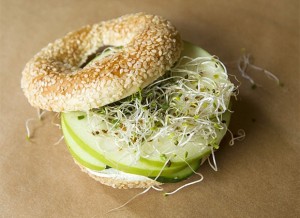In 2011, nearly 4,000 people were infected — and 54 of them died — from a foodborne illness.
The infection was traced to organic sprouts, from a farm whose produce had been contaminated with a deadly strain of Enterohemorrhagic E. coli bacteria (EHEC).
Now, scientists have engineered plants that produce a particular protein that, when added to food, kills seven of the deadliest strains of foodborne E. coli, according to a study published Monday in the Proceedings of the National Academy of Sciences.
Modern agriculture and food production are constantly increasing the risk of contaminating meat or produce with bacteria, because they combine products from many different farms, said study researcher Yuri Gleba, CEO of the German biotech company Nomad Bioscience.
“The very nature of bacteria is if you have one contaminated batch [of food], you have all contaminated batches,” Gleba told Business Insider.
A bacterial strain known as O157:H7 causes about three-quarters of EHEC infections worldwide, but several emerging strains (referred to as the “Big 6″) are also becoming a serious concern.
 Some harmless bacteria naturally produce proteins known as collicins that fight more dangerous EHEC strains. Scientists discovered collicins about 90 years ago, but their effects on the microbes that cause foodborne illnesses haven’t been closely studied, until now.
Some harmless bacteria naturally produce proteins known as collicins that fight more dangerous EHEC strains. Scientists discovered collicins about 90 years ago, but their effects on the microbes that cause foodborne illnesses haven’t been closely studied, until now.
In the study, Gleba and his colleagues tweaked the DNA of spinach, leafy beets, chicory and lettuce to make the plants produce these antimicrobial proteins. They then added these proteins to contaminated food.
In several experiments, the researchers spiked pork fillets with the E. coli strain O157:H7, and sprayed some of the collicins produced by their genetically engineered plants on the meat.
They found that treating the meat with collicins significantly reduced the amount of harmful bacteria present. A “cocktail” of two of these proteins in particular “showed very high activity” against the seven most deadly foodborne pathogens identified by the USDA/FDA.
Gleba thinks you could use these antibacterial proteins as food additives to treat and render contaminated food safe before we consume it — without changing its taste or quality.
The collicins are only effective against a narrow spectrum of microbes, which is why a cocktail of different proteins is needed.
 In future studies, they hope to make their approach more effective against a wider range of harmful bacteria. They also hope to go from the realm of food safety to medicine, where their antimicrobial proteins could possibly be used in lieu of traditional antibiotics.
In future studies, they hope to make their approach more effective against a wider range of harmful bacteria. They also hope to go from the realm of food safety to medicine, where their antimicrobial proteins could possibly be used in lieu of traditional antibiotics.
Broad and efficient control of major foodborne pathogenic strains of Escherichia coli by mixtures of plant-produced colicins
PNAS
Steve Schulz, Anett Stephan, Simone Hahn, Luisa Bortesi, Franziska Jarczowski, Ulrike Bettmann, Anne-Katrin Paschke, Daniel Tusé, Chad H. Stahl, Anatoli Giritch, and Yuri Gleba
http://www.pnas.org/content/early/2015/09/02/1513311112.abstract
Abstract
Enterohemorrhagic Escherichia coli (EHEC) is one of the leading causes of bacterial enteric infections worldwide, causing ∼100,000 illnesses, 3,000 hospitalizations, and 90 deaths annually in the United States alone. These illnesses have been linked to consumption of contaminated animal products and vegetables. Currently, other than thermal inactivation, there are no effective methods to eliminate pathogenic bacteria in food. Colicins are nonantibiotic antimicrobial proteins, produced by E. coli strains that kill or inhibit the growth of other E. coli strains. Several colicins are highly effective against key EHEC strains. Here we demonstrate very high levels of colicin expression (up to 3 g/kg of fresh biomass) in tobacco and edible plants (spinach and leafy beets) at costs that will allow commercialization. Among the colicins examined, plant-expressed colicin M had the broadest antimicrobial activity against EHEC and complemented the potency of other colicins. A mixture of colicin M and colicin E7 showed very high activity against all major EHEC strains, as defined by the US Department of Agriculture/Food and Drug Administration. Treatments with low (less than 10 mg colicins per L) concentrations reduced the pathogenic bacterial load in broth culture by 2 to over 6 logs depending on the strain. In experiments using meats spiked with E. coli O157:H7, colicins efficiently reduced the population of the pathogen by at least 2 logs. Plant-produced colicins could be effectively used for the broad control of pathogenic E. coli in both plant- and animal-based food products and, in the United States, colicins could be approved using the generally recognized as safe (GRAS) regulatory approval pathway.
